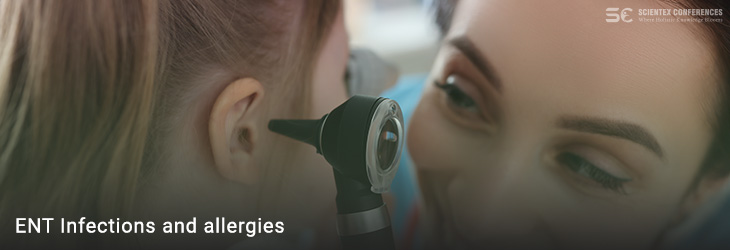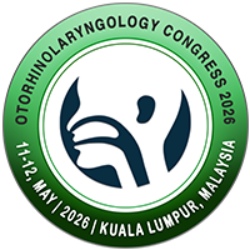Track: ENT Infections and allergies

Session Overview:
This session will delve into the complex interplay between infections and allergies in the field of otolaryngology, focusing on their pathophysiology, diagnosis, and management. ENT infections, such as sinusitis, otitis media, and pharyngitis, remain prevalent in clinical practice and often present alongside allergic conditions like allergic rhinitis and asthma. The session will begin with an overview of the latest research on the etiology and epidemiology of common ENT infections. Participants will learn about the role of bacterial and viral pathogens, the impact of biofilms in chronic sinusitis, and the significance of timely diagnosis in preventing complications. Through case studies and interactive discussions, participants will gain valuable insights into best practices for managing ENT infections and allergies, ultimately enhancing their clinical skills and improving patient outcomes. By the end of the session, attendees will be equipped with the knowledge and tools necessary to address these common and often overlapping conditions in their practice.
Recent Developments:
Recent advancements in understanding and managing ENT infections and allergies have significantly improved patient outcomes and treatment efficacy. This evolving landscape is characterized by enhanced diagnostic techniques, novel therapeutic strategies, and a deeper understanding of the underlying mechanisms of these conditions. One key development is the increased recognition of the role of biofilms in chronic rhinosinusitis. Research has shown that bacterial biofilms can contribute to persistent infections, making them difficult to treat with conventional antibiotics. This has led to a shift in treatment strategies, emphasizing the need for targeted therapies that disrupt biofilm formation and enhance antibiotic efficacy. Advancements in diagnostic technologies have also played a crucial role in the management of ENT infections. Techniques such as endoscopic examination, advanced imaging modalities, and molecular diagnostics (including PCR-based tests) allow for more accurate identification of pathogens. This precise diagnostic capability enables clinicians to tailor treatments to specific infections, reducing the use of broad-spectrum antibiotics and minimizing resistance. These medications, targeting specific pathways in the inflammatory response, have shown promise in providing relief for patients with severe and persistent symptoms, particularly those who do not respond to conventional treatments.
Sub Tracks:
Chronic Sinusitis and Nasal Polyps:
This sub-track will focus on the pathophysiology, diagnosis, and management of chronic sinusitis and associated nasal polyps. Participants will explore the role of inflammation, underlying factors such as allergies and infections, and the latest treatment modalities, including biologics and surgical interventions.
Allergic Rhinitis:
Delve into the mechanisms, triggers, and management strategies for allergic rhinitis. This sub-track will cover the latest advancements in pharmacological treatments, including antihistamines and intranasal corticosteroids, as well as novel therapies such as sublingual immunotherapy and biologic agents.
Tonsillitis and Pharyngitis:
This session will examine the common infectious causes of tonsillitis and pharyngitis, including viral and bacterial pathogens. Discussions will include diagnostic approaches, treatment options, and indications for surgical intervention (e.g., tonsillectomy) in recurrent cases.
Laryngitis:
Participants will explore the causes, symptoms, and management of laryngitis, including both acute and chronic forms. Emphasis will be placed on differentiating between infectious and non-infectious etiologies, along with treatment strategies such as voice therapy and medication management.
Fungal Infections in ENT:
This sub-track will address the growing recognition of fungal infections in ENT practice, including conditions such as fungal sinusitis and otomycosis. Discussions will focus on diagnostic challenges, treatment options, and the importance of identifying risk factors for fungal infections in at-risk populations.
Advanced Diagnostic Techniques in ENT Infections:
Explore cutting-edge diagnostic tools and technologies used to identify infectious agents in ENT disorders. This sub-track will include discussions on molecular diagnostics, imaging techniques, and their clinical applications.
Impact of Environmental Factors on ENT Allergies:
Investigate how environmental factors, such as air quality and climate change, influence the prevalence and severity of allergic conditions. Discussions will focus on public health implications and strategies for prevention.
Role of Telemedicine in Managing ENT Infections and Allergies:
Examine how telemedicine is changing the landscape of care for patients with ENT infections and allergies. This sub-track will discuss its benefits, challenges, and best practices for virtual consultations.
Scientific Highlights
- Anatomical and Physiological Disorders of ENT
- Lung Disease Airway Issues
- ENT Infections and allergies
- New treatment Advances in Otolaryngology
- Ear & Nose plastic surgery
- Endoscopic and laparoscopic ENT surgery
- Craniofacial & Facial surgery
- Otology and Neurotology
- ENT Microsurgery
- COVID 19 and ENT
- Pediatric Otolaryngology
- Speech and Swallowing Disorders
- Head and Neck Surgery
- Airway Management & Surgery
- ENT Allergies & Immunotherapy
- Surgical Techniques in ENT
- Nasal Polyposis and Biologic Therapy
- Advances in Cochlear Implants
- Recent Advances in Otorhinolaryngology
- Vertigo and Balance Disorders


